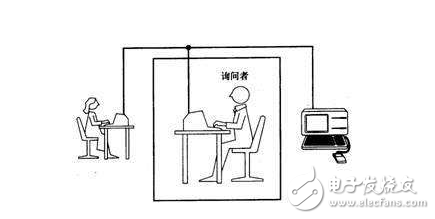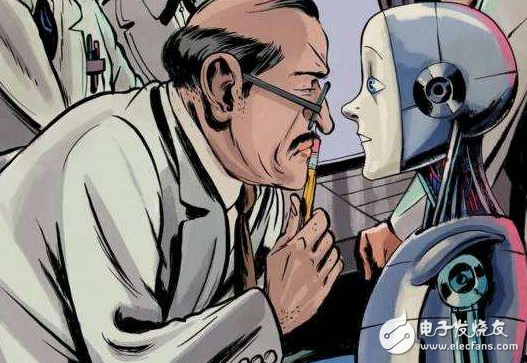What is the Turing test? The Turing test robot is still unable to think.
The Turing test was invented by Alan Messon Turing, which means that the tester is separated from the testee (one person and one machine) by some devices (such as a keyboard). The tester asks questions at will.
After multiple tests, if more than 30% of the testers are unable to determine whether the testee is a human or a machine, then the machine passes the test and is considered to have human intelligence. The word Turing test comes from a paper written in the 1950 book "Computers and Intelligence" by Alan Messon Turing, a pioneer in computer science and cryptography. 30% of them are Turing's machine thinking in 2000. A prediction of ability, we are far behind this prediction.
Turing test contentTuring proposed a way to test whether a machine has human intelligence. That is to say, a computer is very fast, the memory capacity and the number of logical units exceed the human brain, and many intelligent programs are written for this computer, and a large amount of data of a suitable kind is provided. Can you say that this machine has the ability to think?
Turing affirmed that the machine can think. He also gave a definition of the problem of intelligence from the perspective of behaviorism, and thus proposed a hypothesis: a person does not touch each other, through a special way, and the other party A series of questions and answers, if for a long time, he can't judge whether the other person is a person or a computer based on these questions, then you can think that this computer has the same intelligence as the same person, that is, this computer can think. This is the famous "Turing TesTIng". At the time, there were only a few computers in the world, and almost all other computers could not pass this test.

Turing test
It is very difficult to distinguish whether an idea is "self-created" or a well-designed "imitation". Any evidence of self-created thought can be rejected. Turing tried to solve the long-standing philosophical debate about how to define thinking. He proposed a subjective but operational standard: if a computer has the same (act), react, and interact as the conscious individual. Then it should be considered conscious.
In order to eliminate the prejudice in the human mind, Turing designed a "imitation game" that is the Turing test: the human tester in the distance judges the response of the two entities to various questions raised by the two entities within a specified period of time. It is human or computer. Through a series of such tests, the degree of success of computer intelligence can be measured from the probability that a computer is misjudged as a person.
Turing predicts that at the end of the 20th century, there will be computers passing the "Turing test." On June 7th, 2014, at the "2014 Turing Test" conference held by the Royal Society, the host of the University of Reading, UK, issued a press release claiming the artificial creation of the Russian Vladimir Veselov. The intelligent software Eugene Goostman passed the Turing test. Although "Eu Jin" software is far from "thinking", it is also a landmark event in artificial intelligence and even in the history of computers.
Turing test: robots still can't thinkWhat is the Turing test?
If there is a computer now, it is very fast, the memory capacity and the number of logical units are beyond the human brain, and many intelligent programs have been written for this computer, and a large variety of data is provided. This computer can do some personal things, such as simple listening or speaking; then, can we say that this machine has the ability to think?
Alan Turing, the ancestor of artificial intelligence, proposed a method called the Turing test. This principle says that the subject includes a person and a machine that claims to have human intelligence. During the test, the tester is separated from the testee. The tester can only ask the testee some questions through some devices, and the subject matter of these questions is not limited. After asking some questions, if the tester can correctly distinguish who is the person and who is the machine, then the machine does not pass the Turing test; if the tester does not distinguish who is the machine and who is the person, then the machine has Human intelligence. There is currently no machine that can pass the Turing test.
According to the results of the Turing test, the intelligence of the machine is far worse than humans.
text

The Turing test distinguishes between humans and machines, and tests whether the machine has human intelligence, but no one has yet passed the test.
Last weekend was the 100th anniversary of the birth of Alan Turing, the father of artificial intelligence. This year's LoebnerPrize artificial intelligence award was commemorated by him. He moved the venue to the Cambridge, England, where he worked and lived. Lee Garden Museum. The Turing test theory designed by Turing was originally designed to test the degree of machine intelligence, and its application range has been extended more widely.
Text verification code is extremely vulnerable
People who regularly go online should be familiar with the verification code. In fact, the English name of the verification code is "CompletelyAutomatedPublicTuringtesttotellComputersandHumansApart" (automatic distinction between computer and human Turing test, referred to as CAPTCHA). This is a public fully automated program that distinguishes users from computers and people. This problem can be generated and judged by a computer, but it must be limited to humans. Since the computer is still unable to answer the CAPTCHA problem, the user who answers the question can be considered a human.
When we sign up for a website, we often encounter a headache, that is, you must enter a verification code to prove that you are not a robot, but those verification texts are often illegible, and it is easy to enter errors. This problem also makes the spammers feel a headache.
According to Imperva, an Internet security company from Singapore, "One of the drawbacks of it (CAPTCHA) is that it cannot identify human attacks. Therefore, a verification code does not protect the security of the website at all." The hacker has come up with several ways to defeat One of the methods of the CAPTCHA system is to use the "pattern recognition algorithm" to crack the CAPTCHA without human assistance. Such programs have "PWNtcha" and "CAPTCHASniper", and currently more than 60 CAPTCHA programs can be cracked. However, spammers also hire people to identify various CAPTCHAs. Identifying the CAPTCHA verification code has now evolved into a business. The income of these hacker "employees" depends on the speed and accuracy of recognizing CAPTCHA (such as $1-3 for every 1000 verification codes). This poses a challenge to the concept of the entire CAPTCHA.
Play creative games can also prove identity
But now there are already some creative companies coming out to meet the challenge. AreYouaHuman, a startup from Detroit, USA, recently launched PlayThru, a game-based verification service that attempts to replace illegible word-authentication services, such as eyes, nose, and ears. Etc.) Combine into a face. It turns out that human recognition of images is much more advanced than machines.
PlayThru proves its identity by letting users pass a small game. These games are very simple, a bit like the Flash advertising casual game.
AreYouaHuman's official website shows a variety of small games for verification, such as allowing users to drag a motorcycle into a blank parking space, and making a game like a pizza. These games are all made with Flash, Javascript and HTML5 technology, so they support multiple operating systems, and users can verify them based on their own mobile phones and tablets.
Some websites have opened a special Turing test game. The good friends can pass the test to see if they are judged by the computer to be human, half-human and half-machine, or computer.
Having professional knowledge is not equal to being tested
The theory of Turing testing can distinguish between people and machines. If you put this set of theory between people, what will be the result?
According to Turing's theory of testing, sociologists have extended Turing tests and simulation games for people. For example, physicists, chemists, lawyers, and economists are professional groups with specialized technical knowledge and research capabilities. Some people do not have the practical ability to work in these areas of expertise, but they are familiar with the whispers of the field, which has the expertise in the field and can communicate with peer experts; however, they cannot perform practical tasks in the field. . Sociologists call this person "interactive expertise" (interacTIonalexperTIse). Technology journalists, economic journalists or project managers often have certain "interactive expertise" capabilities. Sociologists use simulation games to distinguish between people with "interactive expertise" and real professionals.
Sociologists also found that blind people have more "interactive expertise" than normal people. They have lived in a vision-oriented world for the rest of their lives. They can discuss with normal people, even if they can't see them at all. They usually make reasonable inferences about things they haven't seen based on their own experiences, but normal people can infer their ability to infer less than the blind, and they even make funny and unrealistic guesses. .
Some people read a science book, or watched a technology TV show, or after learning a complicated topic on the Internet, they advertised that they were experts in one aspect, but they only had a certain "interaction." "Professional knowledge", can not pass the Turing test.
Beam Light
1).Excellent pattern,mute,the best effect of the light is 5 to 30 meters.
2).Competitive price and high quality.
3).LCD Chinese and English bilingual menu,brightness.
4).Suitable for performances,bars,banquet hall,multi-purpose conference room,theater,studio,etc.
Our company have 13 years experience of LED Display and Stage Lights , our company mainly produce Indoor Rental LED Display, Outdoor Rental LED Display, Transparent LED Display,Indoor Fixed Indoor LED Display, Outdoor Fixed LED Display, Poster LED Display , Dance LED Display ... In additional, we also produce stage lights, such as beam lights Series, moving head lights Series, LED Par Light Series and son on...
Beam Light Series,Sharpy Beam Light,Led Moving Beam Head Light,Led Beam Light
Guangzhou Chengwen Photoelectric Technology co.,ltd , https://www.cwstagelight.com